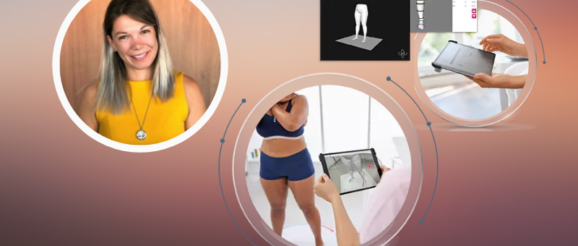How Croatian Q and German medi developed a solution worthy of German Innovation Award

The end of 2020 for the Croatian Q agency was in all regards very successful. Not just in terms of the business itself but of the acknowledgment for doing great work. Q has been collaborating with German medi, the world’s leading manufacturers of medical aids, for years now. This year, medi won the prestigious award for the best innovation in Germany – for two different applications, one of which was built by the Q team.
In collaboration with American partners, Lymphatechnology, Q developed the innovative solution for non-contact measurement for compression fittings. Medi vision was honored in the category #W2 Excellence in B2B – Information Technologies | Industry Specific and Service Softwares. It impressed the German Design Council with its added value for both the medical professional and the patient.
We took the opportunity to discuss a bit more about the solution and its development process, as well as Q’s plans for future ventures in health tech solutions. I found out more in conversation with Sanja Cvek, Project Manager who was directing the process.
Technology and experience make a wholesome product
The basic function of medi vision is to get the measurement for the legs (for now) in order to choose the most suitable product, explains Sanja. Measurement can be added manually into the application or obtained by using the 3D framework. With the framework, medi is scanning the patient and implementing the measures within the application which then recommends suitable products. But besides that, users can also take measures for a custom product order.

Medi vision is a B2B product since it is primarily offered to medi’s partners – clinics, fitting centers, etc. To use the app, you need to attach a special camera to your iPad and that is why it’s more complicated to use it at home. However, that is also facilitated through a great mobile experience, as entire process takes place automatically through a single interface. But, as Sanja points out:
The most attractive part is, of course, the scanning of the selected body part, and the quick creation of a precise 3D model that the user can rotate in the interactive virtual space on the iPad.
This new technology enhances the fitting experience for patients, therapists, and medi certified fitters resulting in more time spent on the treatment of lymphedema, and happier, well-managed patients. Adrian Keindl, Head of Sales at Q, comments:
The goal from the very beginning was to give the customer the best possible product in order to make the whole process of measurement easier and more comfortable.
Intricacies of healthtech development
Co-operation with Medi took place on several levels, from planning and development of strategy, design, all the way to the final development of a unique application, explains Sanja. Even though 3D scanner is not part of the in house development. Q’s team is the one connecting all the other functionalities within the app.
The challenging part of the app is of course having the scanner, but also, having the measures in coordination with the products and recommendations.
Medi vision was developed by a dedicated Medi team at Q which consists of 2 designers, 2 developers, and a PM. Even though the application is on the market, maintenance activities are an ongoing process executed by the team that is also working on developing new functionalities.

Development of healthtech products is specific, but at the end of the day – the best practices of software product development apply here in the same way as it is the case in other project types, Sanja explaines.
Along the way, we’ve learned about the medicine-specific topics that have an impact on product development in this area, as well as the regulations that go hand in hand with these processes.
Further into the field and solutions
Health tech is undoubtedly of the fastest-growing technology enabled industries. According to Deloitte, funding for health tech innovators exceeded US$7.4 billion in 2019 and in 2020 it continues to grow. Health tech solutions likewise propelled this year with telemedicine and other healthcare applications, such as were medi’s.
Q itself is working on multiple other healthtech products – one startup in Switzerland, as well as the world’s biggest player in telemedicine (a US unicorn) but also with plenty of smaller ones as well.
Obviously, COVID-19 has contributed to the increase in demand that players in this market segment have for digital services, Adrian adds. Q is aware of this trend and is establishing relationships with new clients in the field.
The post How Croatian Q and German medi developed a solution worthy of German Innovation Award appeared first on Netokracija CEE.
